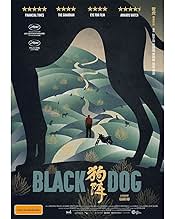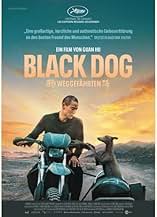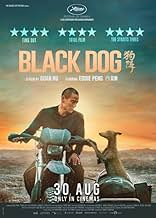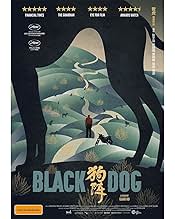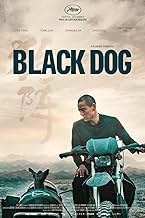Rilasciato dal carcere, Lang torna nella sua città natale nel nord-ovest della Cina. Come membro di una pattuglia cinofila incaricata di eliminare i cani randagi prima delle Olimpiadi del 20... Leggi tuttoRilasciato dal carcere, Lang torna nella sua città natale nel nord-ovest della Cina. Come membro di una pattuglia cinofila incaricata di eliminare i cani randagi prima delle Olimpiadi del 2008, si lega a un randagio nero.Rilasciato dal carcere, Lang torna nella sua città natale nel nord-ovest della Cina. Come membro di una pattuglia cinofila incaricata di eliminare i cani randagi prima delle Olimpiadi del 2008, si lega a un randagio nero.
- Premi
- 17 vittorie e 22 candidature totali
Recensioni in evidenza
A minibus is heading for a small, desolate town on the edge of the Gobi desert. A pack of stray dogs charges towards it, scaring the driver and tipping over the bus. Out of it comes Lang, an ex-convict who used to be a popular stunt motorcyclist, now returning to his hometown after 10 years in prison for the murder of a local gangster's nephew. A few conversations with the police later, the title card appears, and the magic of Black Dog begins. A poetic and minimalist film of healing and moving on, portrayed through a friendship, a bond, a spiritual connection between man and dog. The man is Lang, and the dog is the infamous thin black dog that has been terrorizing the town. Rumored of carrying rabies, the black dog goes around defending his territory by pissing on walls and biting people, so everyone is out to catch him.
Black Dog is a story of two lonely strays caged by a world that does not understand them. Two lost souls alienated by the society around them. Two black sheep who do not fit in. Lang is marginalized because of his past as a "murderer", and the black dog is also alienated amongst the other strays for being the biggest, strongest, fastest and most aggressive of all the dogs. One of Guan Hu's main messages in Black Dog is that no animal is evil. Humans can be, but dogs cannot. Stray dogs are violent because they're in constant fear, trying to survive in an evolving environment where they do not belong. Lang is similar to a stray dog. He's not like the others. He only says a few words in the whole film as he's very quiet and introverted. Like the black dog, he's trying to make a life for himself in a town that's in the process of modernization. After his time in prison, Lang has changed, and so did the town and the people he once knew. So now, he doesn't speak, he only exists and goes with the flow. That's why Lang and the black dog are so perfect for each other and why they instantly connected-they're both just trying to survive in a world they no longer know, a world that no longer wants them.
Black Dog is set during an important time for China, a time of urbanization and change. And this little town is impacted deeply. Most of its residents have fled, leaving their dogs behind, who now roam free in the streets and in the desert hills. The zoo is running out of money to sustain the animals, so they too are freed in the desert. The circus is trying to survive, but business hasn't been good. The old is being demolished to make way for the new, which is a clever pararell with the ending of the film, where the black dog dies but leaves behind a new generation of black puppies. The cinematography of Black Dog is gorgeous, with Guan Hu adopting the new "slow-cinema" Chinese style of Bi Gan, which made me fall in love with the film almost instantly. Long, panoramic shots of beautiful landscapes, quiet scenes of motorcycle rides and slow walks through dusty roads and desolate rural villages, are all complemented with a lonesome atmosphere.
Scenes like Lang and the black dog calmly passing through the desert's stray dogs, and the solar eclipse sequence with the zoo's tiger wandering the town's streets freely, are two of my favorite of the entire year so far. And the final shot of Black Dog is so beautiful and meaningful. Through his canine companion, Lang finally learns how to keep on living despite his dark past, and how to find happiness within life's miseries. The Pink Floyd soundtrack gives a certain nostalgia to Guan Hu's relaxing images, and the acting performances are absolutely stellar, human and animal alike, from Eddie Peng to the black dog named Xiao Xin, and the majestic tiger. Just the fact that Eddie Peng developed such a strong bond with Xiao Xin while filming that he felt he had to adopt him afterwards, is a beautiful real-life illustration of the message of this wonderful film. A melancholic and meditative journey of finding your place in the world through friendship, and a genuine tribute to man's best friend, Black Dog is simply one of the best films of the year, and proof that Chinese arthouse cinema is still very much alive.
Black Dog is a story of two lonely strays caged by a world that does not understand them. Two lost souls alienated by the society around them. Two black sheep who do not fit in. Lang is marginalized because of his past as a "murderer", and the black dog is also alienated amongst the other strays for being the biggest, strongest, fastest and most aggressive of all the dogs. One of Guan Hu's main messages in Black Dog is that no animal is evil. Humans can be, but dogs cannot. Stray dogs are violent because they're in constant fear, trying to survive in an evolving environment where they do not belong. Lang is similar to a stray dog. He's not like the others. He only says a few words in the whole film as he's very quiet and introverted. Like the black dog, he's trying to make a life for himself in a town that's in the process of modernization. After his time in prison, Lang has changed, and so did the town and the people he once knew. So now, he doesn't speak, he only exists and goes with the flow. That's why Lang and the black dog are so perfect for each other and why they instantly connected-they're both just trying to survive in a world they no longer know, a world that no longer wants them.
Black Dog is set during an important time for China, a time of urbanization and change. And this little town is impacted deeply. Most of its residents have fled, leaving their dogs behind, who now roam free in the streets and in the desert hills. The zoo is running out of money to sustain the animals, so they too are freed in the desert. The circus is trying to survive, but business hasn't been good. The old is being demolished to make way for the new, which is a clever pararell with the ending of the film, where the black dog dies but leaves behind a new generation of black puppies. The cinematography of Black Dog is gorgeous, with Guan Hu adopting the new "slow-cinema" Chinese style of Bi Gan, which made me fall in love with the film almost instantly. Long, panoramic shots of beautiful landscapes, quiet scenes of motorcycle rides and slow walks through dusty roads and desolate rural villages, are all complemented with a lonesome atmosphere.
Scenes like Lang and the black dog calmly passing through the desert's stray dogs, and the solar eclipse sequence with the zoo's tiger wandering the town's streets freely, are two of my favorite of the entire year so far. And the final shot of Black Dog is so beautiful and meaningful. Through his canine companion, Lang finally learns how to keep on living despite his dark past, and how to find happiness within life's miseries. The Pink Floyd soundtrack gives a certain nostalgia to Guan Hu's relaxing images, and the acting performances are absolutely stellar, human and animal alike, from Eddie Peng to the black dog named Xiao Xin, and the majestic tiger. Just the fact that Eddie Peng developed such a strong bond with Xiao Xin while filming that he felt he had to adopt him afterwards, is a beautiful real-life illustration of the message of this wonderful film. A melancholic and meditative journey of finding your place in the world through friendship, and a genuine tribute to man's best friend, Black Dog is simply one of the best films of the year, and proof that Chinese arthouse cinema is still very much alive.
Black Dog is a hauntingly beautiful exploration of human resilience and the complexities of morality. Directed with remarkable subtlety, the film masterfully blends psychological depth with poetic storytelling, creating an experience that lingers long after the credits roll.
The strength of Black Dog lies in its characters. Each one is richly drawn, with motivations and struggles that feel deeply authentic. The protagonist's journey is portrayed with such raw vulnerability that it's impossible not to empathize, even as their decisions veer into morally ambiguous territory. The supporting cast elevates the narrative further, delivering performances that are understated yet profoundly affecting.
Visually, the film is a masterpiece. The cinematography captures both the starkness and the beauty of the settings, using light and shadow to evoke an atmosphere of tension and melancholy. The use of symbolism is subtle but powerful, adding layers of meaning without feeling forced or pretentious.
The pacing is deliberate but never dull, allowing the story to unfold organically. This measured approach heightens the emotional impact, drawing the audience deeper into the characters' world. The soundtrack, too, deserves special mention-it complements the narrative perfectly, blending traditional and modern elements to underscore key moments.
At its core, Black Dog is a meditation on survival and redemption. It challenges viewers to confront uncomfortable truths about human nature while offering a glimmer of hope amidst the darkness.
The strength of Black Dog lies in its characters. Each one is richly drawn, with motivations and struggles that feel deeply authentic. The protagonist's journey is portrayed with such raw vulnerability that it's impossible not to empathize, even as their decisions veer into morally ambiguous territory. The supporting cast elevates the narrative further, delivering performances that are understated yet profoundly affecting.
Visually, the film is a masterpiece. The cinematography captures both the starkness and the beauty of the settings, using light and shadow to evoke an atmosphere of tension and melancholy. The use of symbolism is subtle but powerful, adding layers of meaning without feeling forced or pretentious.
The pacing is deliberate but never dull, allowing the story to unfold organically. This measured approach heightens the emotional impact, drawing the audience deeper into the characters' world. The soundtrack, too, deserves special mention-it complements the narrative perfectly, blending traditional and modern elements to underscore key moments.
At its core, Black Dog is a meditation on survival and redemption. It challenges viewers to confront uncomfortable truths about human nature while offering a glimmer of hope amidst the darkness.
Outstanding drama directed by Hu Guan from China, so, no wonder it won the top honour in the Un Certain Regard sidebar at Cannes for this year.
The story revolves around a guy who, following a period of incarceration, comes home and takes a job ridding a town of stray dogs in time for the Olympic Games. The drama is set on the edge of the Gobi desert in Northwest China. However, he unexpectedly bonds with a black dog, and the two of them set out on a new adventure.
The dog star of the movie took home a dog award earlier in the day when he received the Palm Dog Grand Jury prize! If you love dogs, amazing cinematography, exceptional acting and directing - do not miss this one... impossible not to enjoy it!
The story revolves around a guy who, following a period of incarceration, comes home and takes a job ridding a town of stray dogs in time for the Olympic Games. The drama is set on the edge of the Gobi desert in Northwest China. However, he unexpectedly bonds with a black dog, and the two of them set out on a new adventure.
The dog star of the movie took home a dog award earlier in the day when he received the Palm Dog Grand Jury prize! If you love dogs, amazing cinematography, exceptional acting and directing - do not miss this one... impossible not to enjoy it!
Many films about the special relationship between man and his four-legged best friend have been made over the years, and it's a formula that nearly always manages to please. So it is with the latest offering from writer-director Guan Hu, the story of a former inmate who's been paroled to his hometown on the fringe of the Gobi Desert in northwestern China after 10 years in prison for a manslaughter conviction, an incident in which he had apparently become unwittingly involved. As he seeks to make amends for his past and start his life over, former motorcycle stunt artist/musician Lang Yonghui (Eddie Peng) returns to his roots as China had become engaged in an aggressive, ongoing national program of upgrading its infrastructure in preparation for the 2008 Beijing Olympics. In this case, this undertaking is a much-needed improvement for a faltering community that has become seriously run down and depopulated. And that exodus, in turn, has created a secondary problem: as many former residents departed, they abandoned their pets (especially dogs), creating a population of strays that has now ballooned to overwhelming proportions. Given this preponderance of feral canines - many of whom have become unruly, vicious and a public health risk - local authorities are in desperate need of help in rounding them up. In light of that, as part of Lang's government-sanctioned reintegration program, he is assigned to a job in animal control. But, as something of an unassuming soft touch, he struggles to carry out his duties. That becomes particularly true when he's charged with corralling a gaunt, mangy, assertively territorial black dog (Xin) suspected of having rabies, a scenario that leads to a decidedly belligerent confrontation between man and beast. However, once the stray is in custody, Lang and his captive begin developing an unexpectedly close bond. Lang ends up adopting the pooch, and they thus embark on an odyssey of self-discovery for themselves and one another as they work through issues of their own making and the exploration of their newfound relationship. The result is a heartwarming tale filled with genuine affection and loving mutual support, admittedly sometimes a tad obvious in their depiction but undoubtedly always sincere to the core. The narrative truly works best when it focuses on this primary relationship, a story thread that, regrettably, is sometimes intruded upon a little too much by an array of subplots whose variable, sometimes under-explained development and occasionally meandering nature can detract from what works best. Nevertheless, these minor distractions aside, "Black Dog" is an otherwise-engaging, enjoyable saga of two outcasts in search of redemption and the wonders that the power of friendship can work for those looking to get their lives back on track. But, then, that's why our four-legged furry companions have deservedly earned their reputation as man's best friends. This winner of the 2024 Cannes Film Festival Un Certain Regard Award and Independent Spirit Award nominee for Best International Film is available for streaming online.
It's a good movie and i wish i would have liked it more and rated it higher. It's so well directed that made me somewhat enjoy it even though nothing significant was happening, specifically during the first 50 minutes. The parallelism between the leading character and this dog was spot-on, the development of their "relationship" as well.
But still, there are some big flaws. First of all, its running time. It should have been at least 15 minutes shorter. I said i enjoyed it but it was too uneventful at some point. I love poetic and minimalist movies but not like this. Story is almost beautiful but simple, there was no reason to stretch it out so much. Ok, it was beautifully shot but after all, it was mostly an urban landscape.
And as another reviewer already mentioned, at times "The plot felt aimless". I didn't understand the entirety of what happened in this movie. Random things kept happening without promoting the story.
However, despite its flaws, this is a good and ambitious movie, well directed as i said but well acted too. The leading character was silent but as a viewer, i understood him, i felt his alienation, his quite desperation and his bond with this dog, the whole thing was touching and natural, not for a moment it felt fake. There were some gorgeous scenes, a great soundtrack with Pink Floyd's songs which were used so effective. And the ending was powerful.
A meditative movie which could have been so much better.
But still, there are some big flaws. First of all, its running time. It should have been at least 15 minutes shorter. I said i enjoyed it but it was too uneventful at some point. I love poetic and minimalist movies but not like this. Story is almost beautiful but simple, there was no reason to stretch it out so much. Ok, it was beautifully shot but after all, it was mostly an urban landscape.
And as another reviewer already mentioned, at times "The plot felt aimless". I didn't understand the entirety of what happened in this movie. Random things kept happening without promoting the story.
However, despite its flaws, this is a good and ambitious movie, well directed as i said but well acted too. The leading character was silent but as a viewer, i understood him, i felt his alienation, his quite desperation and his bond with this dog, the whole thing was touching and natural, not for a moment it felt fake. There were some gorgeous scenes, a great soundtrack with Pink Floyd's songs which were used so effective. And the ending was powerful.
A meditative movie which could have been so much better.
Lo sapevi?
- QuizEddie Peng [the lead] established such a strong bond with Xin, the dog featured in the film, that he adopted him after filming had wrapped.
- ConnessioniReferenced in Close-Up: The Best Films and Other Results of 2024 (2024)
- Colonne sonoreMother
Written by Roger Waters
Performed by Pink Floyd
I più visti
Accedi per valutare e creare un elenco di titoli salvati per ottenere consigli personalizzati
Dettagli
Botteghino
- Lordo in tutto il mondo
- 2.336.260 USD
- Tempo di esecuzione
- 1h 56min(116 min)
- Colore
- Mix di suoni
- Proporzioni
- 2.47 :1
Contribuisci a questa pagina
Suggerisci una modifica o aggiungi i contenuti mancanti


